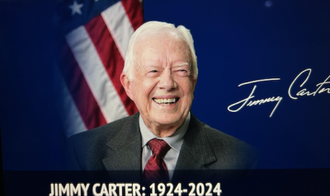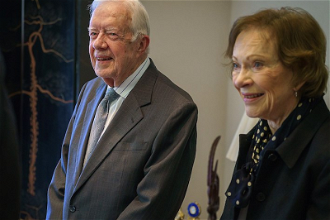The Jimmy Carter I knew

Screenshot from Carter Centre website
Jimmy Carter will be celebrated for his foresight in urging the world to take climate change seriously, decades before it became fashionable. He should also be remembered for standing up for a tolerant and inclusive reading of Christianity, at odds with the prevailing fundamentalist tide in his native Deep South.
But my memories of President Carter are from working together to promote the work of the Carter Center, the foundation based in Atlanta, Georgia, which he started when he left the White House. It became renowned for promoting democracy and running health programmes around the world.
In 2003, my husband and I sent a modest donation to the Carter Center. Soon after, we were surprised to get an invitation to have dinner with Mrs Carter when she was passing through London. We expected to find ourselves at a big event, sitting at a circular table at the back of a packed ballroom in a posh hotel in Park Lane. Instead, there was only one other couple present.
By the end of the evening, my husband, Henry was sitting on the radiator beside the former first lady, drinking wine and gossiping. She asked us to set up the European branch of their charity. How could we refuse?
Once we had registered the Carter Centre as a charity in the UK, Henry and I were involved in organising a fundraising dinner in London. Days before the event, the president's staff warned us several times that the Carters were coming straight from Nigeria, where they had been overseeing their impressive medical projects, and that consequently they would be exhausted.
"You can have them for fifteen minutes only," we were told. "They'll circulate at the drinks thing before the dinner, but then they'll be gone."
We warning our guests in advance not to expect too much exposure to the great man and his equally remarkable wife. Yet, on the night itself, not only did the president chat to everyone in the room, but he stayed for dinner, and treated us to an off-the-cuff verbal tour of the global political scene.
Mrs Carter sat at one end of the table, with the president anchoring the other. Showing no interest in the food before him, he began talking as we embarked on our starter, and he was still on his feet when we reached coffee. The only interruption came from Rosalynn, who kept interjecting with corrections and remarks. As she raised her voice, he would sink into his chair, and she would get up. Then, when she had finished, he would stand once more, resuming his comments. It was like watching a tennis match.
His aids looked on, resigned to yet another Carter family performance. Our guests were thrilled, and Marjorie Scardino, the high-powered US-born chief executive of Pearson group, concluded the evening in tears, telling the gathering that President Carter restored her pride in being an American.
I went on election monitoring missions with the Carters on two occasions, in Mozambique in 2004 and Liberia the following year. On our first night in Maputo, the team gathered in a hotel conference room, where President Carter welcomed us, like a general rallying his troops before battle. Dressed casually in baseball cap, sneakers, and chinos, he was up-beat and buzzing with energy. Rail-thin and fragile at eighty-one, he radiated Southern charm and good cheer.
Over the following week, his toothy grin and optimistic disposition never wavered, even as the power cuts, and the heat and humidity sapped the energy of all present. We set out from our base in Maputo, thrilled to be part of his group, and keen to do him proud as we travelled into the obscure north-eastern region to monitor the election. Five days later, we were back in the capital, awaiting the final official election results.
On polling day President Carter was a veritable one-man customer complaints line. People around Maputo phoned him, reporting minor voting irregularities. Carter rushed to the offending polling station where he caused a scene, phoned Frelimo's presidential candidate, Armando Guebuza, and stayed on the phone with the wretched man until the irregularities were put right.
I recall President Carter sitting at a table at our headquarters hotel, a baseball hat on his head, and a plate of greasy French fries smothered in ketchup before him. His cell phone was glued to his ear, as he harried regional election officials to investigate reports of ballot queries.
He was equally passionate in his commitment to eliminate guinea worm, a devastating water-borne disease that disabled thousands of people each year, before the Carter Centre set out to vanquish it from Africa. At the time of writing, there are a mere handful of case left. It will be only the second disease that has been completely eradicated, the first being smallpox. What an incredible legacy, and what an incredible man.
Read the official obituary on the Carter Centre website: www.cartercenter.org/index.html

















